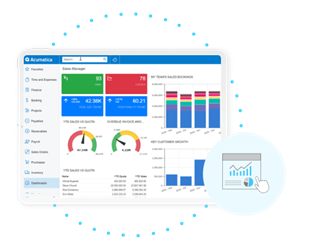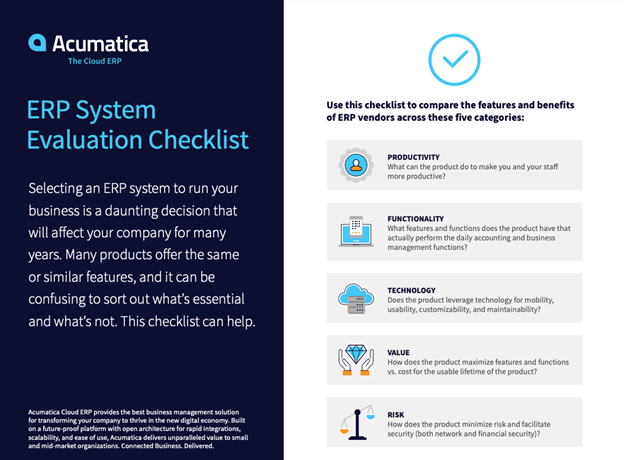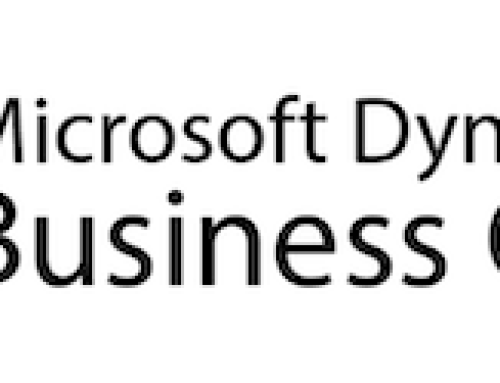
Implementing an ERP (Enterprise Resource Planning) system is a significant investment for any business. Choosing the right ERP system is crucial, as it offers a multitude of benefits, such as increased operational efficiency, improved customer service, and enhanced decision-making capabilities. However, selecting the wrong ERP can lead to wasted resources, operational inefficiencies, and even business failure. Therefore, it becomes paramount for businesses to have a comprehensive checklist when choosing an ERP system.
It’s essential to understand that every business is unique, and what works for one may not work for another. Therefore, since many ERP products offer similar features, it can be confusing to sort out what’s essential for your business and what’s not. We are sharing a few checklists to get you started.
What is an ERP and Why Do Businesses Need It?
An ERP system integrates various business processes into one unified system, streamlining operations, and improving efficiency. ERP systems can handle a wide range of functions, including finance, human resources, sales, marketing, supply chain management, and more. With an ERP system, businesses can eliminate data silos, reduce manual tasks, and enhance visibility across the organization.
The need for ERP systems in businesses is increasing, primarily due to their ability to streamline operations and improve decision-making. ERP systems provide real-time data, enabling businesses to make informed decisions quickly. Moreover, an ERP system can automate repetitive tasks, freeing up staff time to focus on strategic activities. In today’s competitive business environment, having an efficient, integrated system like an ERP is no longer a luxury but a necessity.
The Ultimate ERP Selection Checklist
Ultimate ERP System Evaluation | Distribution Management | Manufacturing Management
Now that we understand what an ERP system is and why businesses need it, let’s delve into the ultimate ERP selection checklist. These checklists will guide you through the process of selecting an ERP system that best fits your business needs. It includes evaluating your business needs and goals, determining budget and total cost of ownership, checking ERP features and functionality, evaluating ERP vendor’s reputation and reliability, ERP implementation and training support, post-implementation support and maintenance, and future-proofing your ERP system.
Evaluating Your Business Needs and Goals
The first step in selecting an ERP system is understanding your business needs and goals. This involves identifying the challenges your business is facing and how an ERP system can help overcome them. Are you looking to streamline operations, improve customer service, or enhance decision-making? Once you’ve identified your needs, it’s crucial to set clear and measurable goals. This will help you assess the success of your ERP implementation.
Next, map out your business processes. This will give you a clear picture of how your business operates and where inefficiencies lie. Once you’ve mapped out your processes, you can look for an ERP system that aligns with them. Remember, an ERP system should complement your business processes, not complicate them.
Determining Budget and Total Cost of Ownership
Determining your budget and understanding the total cost of ownership of an ERP system is a critical step. ERP systems can be a significant investment, and it’s essential to ensure that you get a good return on your investment. Look beyond the initial purchase price and consider ongoing costs such as maintenance, upgrades, and user training.
It’s also crucial to consider the cost of not implementing an ERP system. If your current systems are inefficient or outdated, they could be costing you in terms of lost productivity, poor customer service, and missed opportunities. Weigh these costs against the investment in an ERP system.
ERP Features and Functionality

An ERP system should have the features and functionality needed to support your business processes. Make a list of must-have features and nice-to-have features. This will help you narrow down your options and ensure that you don’t end up with a system that is overcomplicated or lacks essential features.
Consider both current and future needs. While it’s important that the ERP system can handle your current processes, it should also be able to accommodate growth and changes in your business.
Evaluating ERP Vendor’s Reputation and Reliability
The reputation and reliability of the ERP vendor are as important as the system itself. Do your research and check for customer testimonials and reviews. Look for a vendor with a proven track record in your industry. It’s also essential to evaluate the vendor’s financial stability. You want to ensure that they will be around to support you in the long run.
ERP Implementation and Training Support

Implementing an ERP system is a complex process that requires careful planning and execution. Look for a vendor that offers robust implementation support to ensure a smooth transition. This includes project management, data migration, system configuration, and testing.
Training is another critical factor to consider. Your staff needs to know how to use the ERP system effectively. Ensure that the vendor provides comprehensive training and support.
Post-Implementation Support and Maintenance
Post-implementation support and maintenance are crucial to the success of an ERP system. Ensure that the vendor offers robust support, including troubleshooting, upgrades, and regular maintenance. This will ensure that your ERP system remains up-to-date and continues to meet your business needs.
Future-Proofing Your ERP: Scalability and Flexibility
Finally, you need to future-proof your ERP system. This means ensuring that it can grow and adapt with your business. Look for a system that is scalable and flexible. It should be able to handle increased data volume and accommodate new business processes as your business grows and evolves.
Making The Right Decision About Your ERP Selection

Selecting the right ERP system is a crucial decision that can significantly impact your business’s success. With our comprehensive ERP selection checklists, you can ensure that you make the right decision based on your business needs and goals. Remember that an ERP system is not a one-size-fits-all solution. It needs to align with your business processes and be flexible enough to grow with your business.
Many businesses find it helpful to go over their results with one of our ERP experts. Give our CAL Business Solutions team a call at (860) 485-0910 ext. 4 or email us at sales@calszone.com and we would be happy to help you.
Download our free checklists:
Ultimate ERP System Evaluation | Distribution Management | Manufacturing Management
By CAL Business Solutions, Acumatica Partner, www.calszone.com

















